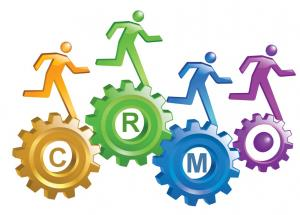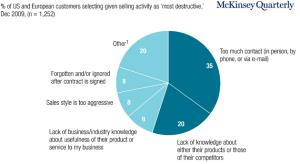
How sales engagement is changing and what we need to do to stay ahead of the wave in order to protect and grow revenues
.
Businesses face three disturbing sales issues:
- The majority of organisations are not satisfied with their CRM.(1)
- A majority of customers believe the salesperson is wasting too much of their time and not adding enough value to their decisions. (2)
- Traditional 'solution selling' is rapidly losing its effectiveness - we are under pressure to rethink the way we sell. (3)
.
.
.
Most B to B CRM implementations need to focus more on value based engagement; the quintessential human interaction that is the foundation of B to B business.
We need to turn CRM on its head. In this article we show that by empowering the business engagement people to deliver more value in fewer customer engagements we solve both our CRM and our customer perception issues. And we will look at some recommendations to enable this.
The business of doing business with business, the so called "B-to-B CRM sales process", is about relationships. It is about identifying them, creating them, nurturing them and through a process of active engagement, developing a deep understanding of a customer's business, the people involved and the unique business challenges they face. All of these factors when combined provide insight to possible solutions and how to position value through the engagement.
Yet it is notable that significantly more B2B CRM implementations fail than succeed.
To answer this question we need to look at how today's B-to-B CRM systems actually work.
Underlying CRM Design Issues:
Too often the core focus of tradition CRM sales systems is to provide forecast and pipeline information. They rely on the client engagement person to "feed" relevant opportunity information and status.
Many CRM solutions are now augmented with:
- Portals from Marketing and Product departments providing valuable information on the company's products, services and their benefits plus reports on the customers industry, white papers and information about competitors.
- "Customer" information databases, a central place where "all" information about a customer can be stored and retrieved.
- Social enterprise functionality and information sources have been added.
With all this added functionality why do business pursuit teams feel alienated, complain they have too much administration to complete and why are their forecasts seemingly so inaccurate?
Also why do Sales Directors still consistently acknowledge that their annual forecast pipeline information is risky or highly risky?
Most salespeople will give us the answer - "My CRM does not help me do my job - that is, to engage effectively with my client. Therefore I find it onerous and unrewarding to feed our CRM system with data".
CRM - Management versus Sales
CRM sales automation has typically been implemented as a tool for management to monitor and manage the sales process and provide a forecast. It is a "control" tool used to manage the sales process rather than a tool of sales enablement (4) to enhance the engagement process.
Why do customers complain about aggressive sales personnel taking up too much of their time, often lacking the depth of business and industry knowledge, and surprisingly lacking in knowledge about competitors. Customers also complain that sales teams focus too much time on product and service features and functions and not on business solutions and value?
The answer is in the nature of the process that B-to-B CRM so boldly tries to define and manage.
CRM solutions have many characteristics of "all stick and no carrot". The process is often owned and staffed by Sales Operations and/or Finance Operations. The skills in these areas are typically analytical and with substantial financial modelling ability. They are capable of creating pivot tables for all manner of reporting by products, by services, by business divisions and in aggregate.
As with all processes that focus on reporting, a common weakness is the old adage of "garbage in garbage out". Critically today's CRM relies on reluctant salespeople to provide the information. Often this is a manual, error prone, and a time consuming activity. Have you ever met a salesperson with data entry as their core skill?
The "internal company discussion" with Sales teams therefore is a compromise dialogue about opportunity status.
The "external customer discussion " with the sales team is therefore a compromise of multiple factors, the client needs and pressures, the management of the sales process and the need to meet marketing and product/service outcomes.
The solution:
The Goal of a B to B CRM process should be to [private] engage effectively with the client in order to create the winning value proposition. It should be to influence through unique insight into the challenges and solutions in the most efficient way, providing status reporting as a by product. Thus assist the salesperson to move from solution selling to insight selling as outlined by by Adamson, Dixon and Tobin in their Harvard Business Review article - The end of Solution Sales
To achieve this goal the CRM process and tools must provide more value for sales people in the following ways:
- Pro-actively source the information they need to gain insight so to engage their client - when they need it, where they need it.
- Enhance the actual "engagement experience" with the client that can extend and create new value based discussions.
- Provide sales teams with mobile collaboration that they can use to manage internal interactions to meet client/sales time-frames.
- Enable Sales insight to maximise the time spent on identifying unique business challenges and creating and testing value propositions.
- Broaden the interactions with other channels to interact with their client specifically around education and collaboration.
- Minimise engagement time between the sales function and sales operations needed to achieve the required reporting. Do this by extracting more information from "sales" platforms and rely less on data entry from sales people.
.
Conclusion:
We are not recommending that your replace your CRM. However we suggest a rethink of CRM implementations from the point of customer engagement back. If we refocus it for the salesperson the rest is more likely to follow. We need to provide salespeople with engagement tools that support the way they work. Tools designed specifically for sales teams - tools they value and want to use - tools that enhance their selling activities - not impede them.
These engagement tools should include:
- Intuitive planning tools to make account planning and engagement strategy more effective
- Tools that provide insightful information to help leverage more business value in their consultative engagement with the customer.
- Collaborative work tools to assist them lead their virtual sales team to victory.
- Mobility - all of the above they need while they are on the move.
And for sales management, as a side benefit, we need to feed the CRM pipeline management and forecasting machine by extracting up to date information from these sales tools without overpowering the salespeople with administrative activity.
If we provide salespeople with tools that work the way they work and help them do their job they will use them. The result will be:
- Increased sales
- Improved sales productivity
- More accurate pipeline and forecast information
- A more successful CRM implementation
.
REFERENCES:
(1) CRM From Hell - CRM Failures: The numbers don't lie.
(2) McKinsey's - Basics of B2B engagement success
(3) Harvard Business Review - The end of Solution Sales by Adamson, Dixon and Tobin
(4) Geoff Ernst - The Sales Enabler
********

Your Invitation: I invite you to join the Sales Leader Forum group on LinkedIn where you can experience informative discussions with your peers and sales thought leaders on subjects like the one we have discussed here. I also invite you to subscribe to the
- Sales Leader Resource Centre here
- Sales Leader YouTube channel here (300+ sales leadership videos)
Please Share: If you valued this article, please share via your Twitter, LinkedIn, Google+ and Facebook social media platforms. I encourage you to join the conversation or ask questions. So feel free to add a comment on this post - I promise to respond. If inclined please follow my LinkedIn post page here.
Want to touch base? If you have questions please feel free to contact me - email: john.smibert(at)salesleaderforums.com, Phone: +61 404857893 or Skype: john.smibert